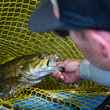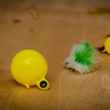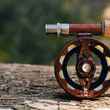I’ve spent much of my life writing for money and, because I’m a whore, all too often I’ve mined the things I love for subjects. One of these things is fly fishing, though I readily admit I’ve never written about it very well. I’ll also admit that, despite a lifetime of trying, I’ve never actually fly fished very well, either. This is part of the allure of worthwhile pursuits, that even when you do one with some level of occasional proficiency, the next day can be a completely different situation.
Luckily, taking photos of fly fishing is easier. Beautiful places, rugged individuals, humanity vs nature, eye-wateringly vivid fish captured on aesthetically pleasing, intricately tied flies … I want to say it’s harder to take bad fly fishing pics than good ones, but a quick scroll through Instagram proves otherwise. I’ve spent countless hours crouched by all manner of water swatting bloodthirsty insects with my camera while comrades wave sticks and lines around. The waving may as well be performative. As a photographer, a failure to hook up doesn’t impact my catch of easy-to-sell images for brands, media, and even fine art prints.
TL,DR: as any experienced writer knows — don’t @ me, photographers — making quality words is exponentially harder than quality pictures.
Yeah, I’ve dabbled with the keyboard. Plucked low hanging fruit for mags I
worked at or ranted for
odd niche fishing publications but, as Kenny Rogers crooned,
‘if you’re gonna play the game boy, you gotta learn to play it right.’
Therein lies the problem with writing about fly fishing: Doing it right. Because most don’t.
A big barrier for aspirational fly fishing wordsmiths looking to stand out is the preexisting murderer’s row of actual literary legends. Titans like Hemingway, Harrison, McGuane, Brautigan, and Arnold Gingrich — whose book Esquire editor-in-chief David Granger gifted me on my first day as a staff writer — leave a mountain of unfillable wading boots. In the modern era, writing about angling has become a trope. Bookstores ‘sports’ sections and our glossiest print mags bloat with awkward men (and it’s always men) wrestling with their father’s memory, humblebragging about trips or fish most of us will never experience, egomaniacally chasing nostalgia in their later years, or eulogizing lost dogs with the misplaced confidence of a man whose friends ‘like’ all their Tweets. For the reader, these stories scratch an itch, discussing a pastime we, a target audience, is obsessed with. Yet ultimately most are instantly forgettable.




























